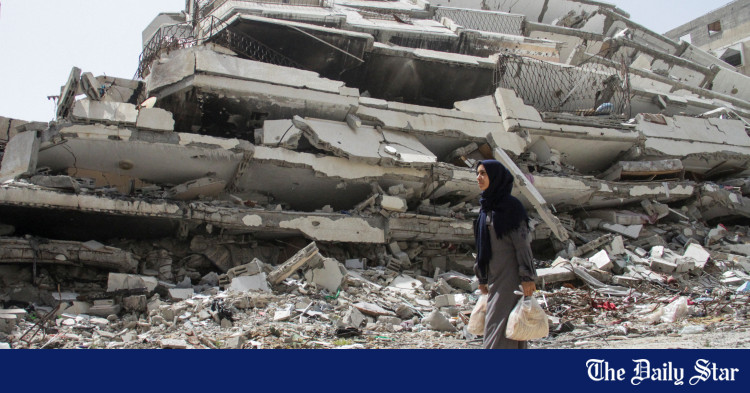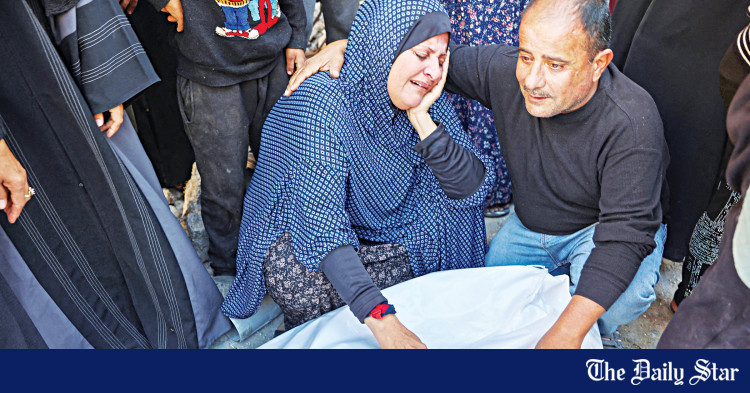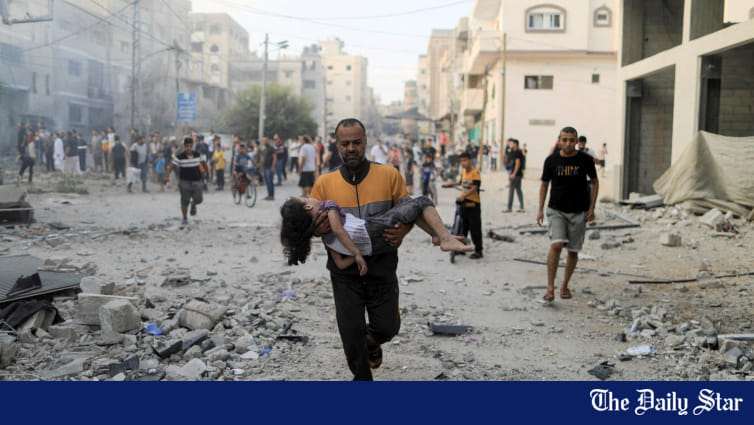Saif
Senior Member
- Joined
- Jan 24, 2024
- Messages
- 15,410
- Nation

- Axis Group


Critical race theory, Euro-American pride and the genocide in Gaza
Proponents of CRT believe that racist practices are not individual or idiosyncratic, but are inherent in institutions, policies and structures of governance.
Critical race theory, Euro-American pride and the genocide in Gaza

Photo: Reuters
The critical race theory (CRT) emerged in the United States between the 1970s and 1980s and gained momentum in academic circles in the late 1990s. The theory addresses racial inequalities and injustices and explicates how racism operates in society and is normalised. Ideas of legal scholar Derrick Bell, who became the first tenured black professor at Harvard University in 1971, are considered instrumental in expanding this theory. He was once "arrested for using a Whites-only phone booth in Jackson" in Mississippi.
The CRT took a discursive form in Bell's 1970 book Race, Racism, and American Law, which argues that White supremacy is an integral part of US institutions. He argued that victories of the civil rights movement in the US "were not a sign of moral maturation in White America but a reflection of its geopolitical pragmatism." At 28 years old, Barack Obama introduced Bell to a rally at Harvard and said, "[Bell's] scholarship has opened up new vistas and new horizons and changed the standards of what legal writing is about."
The 1995 anthology of essays titled Critical Race Theory: The Key Writings That Formed the Movement articulated the principal arguments of CRT and gave it a wider scope. Subsequently, the 1619 Project was launched in the US in 2019 to commemorate the 400th anniversary of the arrival of first African slaves in North America. It sought to relook at the country's history by rediscovering the contributions of African-Americans to American society from colonial Virginia to the present day. The project created an urgency to understand the long and enduring legacy of slavery in the US and thus increased the importance of CRT.
In 2020, in the aftermath of the killings of Breonna Taylor and George Floyd by White police officers in the US, protest marches under the banner of the Black Lives Matter (BLM) movement broke out in cities around the world. As a result, critical race theory came to prominence again as an emancipatory discourse. Its proponents felt vindicated that such killings "were not anomalies but evidence that the system was functioning as it was designed to." Especially in the US, academics gave CRT renewed attention to address racial disparities through the education system and put its opponents on the ropes.
Proponents of CRT believe that racist practices are not individual or idiosyncratic, but are inherent in institutions, policies and structures of governance. While persistence of discrimination and oppression is looked at through the prism of slavery and racial segregation in the US, in Europe the focus is on colonialism and the slave trade.
Emboldened and stoked by political demagogues both in Europe and the US, opponents of the critical race theory have mounted resistance under the pretext of defending positive images of their countries that were involved in colonialism, slavery and other forms of oppression. They view it as an attempt to "cannibalise" Euro-American countries. For instance, an anti-CRT commentator in the US complained that CRT teaches "young people to hate the country they are going to inherit."
Critics also argue that CRT leads to the indoctrination of students into anti-White stereotyping and the perpetuation of a struggle between Black and White people. Cynics among its detractors characterise the theory as "Black-supremacist racism, false history, and the terrible apotheosis of wokeness." Many US states have banned CRT or any discussion that characterises the US society as inherently racist and segregationist. However, many agree with Derrick Bell and believe that critical race theory "means telling the truth, even in the face of criticism."
Critics of critical race theory don't deny that people of colour endured unspeakable injustice in the past through racism, colonialism, transatlantic slavery and other systems of exploitation. Nor do they seemingly suggest that such discriminatory practices should continue. They tend to focus on the here and the now and seek to herald a new beginning. Diverse groups of people rally around this idea of emphasising the present and the future.
For example, in the run up to the Commonwealth Summit (October 25-26, 2024) in the small island country of Samoa, there was a row between some member countries and former coloniser Britain on the question of reparation for slavery and colonialism. Although the British PM acknowledged that the slave trade was "abhorrent," he was unwilling to discuss the question of reparation in the summit. He expressed a desire to be "forward-looking" and to address "today's challenges." In this respect, the British government is not alone; other former colonial and slave-owning powers would perhaps make similar statements when they are forced to address the question of reparation.
Against this backdrop, the ongoing genocide in Gaza stares in the face of Western governments. It belies their assertion that they really "abhor" historical injustices for which repair and reckoning are being demanded. Their complicity in the killings in Gaza don't prove that they are opposed to injustices or committed to a just world where apartheid and ethnocentric arrogance are unacceptable.
Without the continuous supply of deadly weapons and ammunition from—and diplomatic coverups by—the US, Britain, Germany and some other former colonial countries, Israel would not have been able to continue its ongoing genocide in Gaza for over a year. This sponsorship of genocide is making it impossible for citizens of these powerful countries to throw off their sense of guilt. Rather, it is adding more reasons for them and for their future generations to be ashamed of the actions of their governments.
Since October 7, 2023, tens of thousands of innocent Palestinian babies, children, women and men have been killed in Gaza. This is robbing the conscientious people of genocide-enabling countries of their national pride. What's more, decades and centuries down the road, it will bring shame on citizens of the countries that have abetted it. Their future generations may not feel proud to know that their countries stood by a genocide-perpetrating regime even when it was slaughtering hundreds of healthcare providers and journalists so no one can treat the injured or report its massacres.
In these circumstances, can one really say that critical race theory is irrelevant in today's world?
Dr Md Mahmudul Hasan is a professor in the Department of English Language and Literature, International Islamic University Malaysia.
Photo: Reuters
The critical race theory (CRT) emerged in the United States between the 1970s and 1980s and gained momentum in academic circles in the late 1990s. The theory addresses racial inequalities and injustices and explicates how racism operates in society and is normalised. Ideas of legal scholar Derrick Bell, who became the first tenured black professor at Harvard University in 1971, are considered instrumental in expanding this theory. He was once "arrested for using a Whites-only phone booth in Jackson" in Mississippi.
The CRT took a discursive form in Bell's 1970 book Race, Racism, and American Law, which argues that White supremacy is an integral part of US institutions. He argued that victories of the civil rights movement in the US "were not a sign of moral maturation in White America but a reflection of its geopolitical pragmatism." At 28 years old, Barack Obama introduced Bell to a rally at Harvard and said, "[Bell's] scholarship has opened up new vistas and new horizons and changed the standards of what legal writing is about."
The 1995 anthology of essays titled Critical Race Theory: The Key Writings That Formed the Movement articulated the principal arguments of CRT and gave it a wider scope. Subsequently, the 1619 Project was launched in the US in 2019 to commemorate the 400th anniversary of the arrival of first African slaves in North America. It sought to relook at the country's history by rediscovering the contributions of African-Americans to American society from colonial Virginia to the present day. The project created an urgency to understand the long and enduring legacy of slavery in the US and thus increased the importance of CRT.
In 2020, in the aftermath of the killings of Breonna Taylor and George Floyd by White police officers in the US, protest marches under the banner of the Black Lives Matter (BLM) movement broke out in cities around the world. As a result, critical race theory came to prominence again as an emancipatory discourse. Its proponents felt vindicated that such killings "were not anomalies but evidence that the system was functioning as it was designed to." Especially in the US, academics gave CRT renewed attention to address racial disparities through the education system and put its opponents on the ropes.
Proponents of CRT believe that racist practices are not individual or idiosyncratic, but are inherent in institutions, policies and structures of governance. While persistence of discrimination and oppression is looked at through the prism of slavery and racial segregation in the US, in Europe the focus is on colonialism and the slave trade.
Emboldened and stoked by political demagogues both in Europe and the US, opponents of the critical race theory have mounted resistance under the pretext of defending positive images of their countries that were involved in colonialism, slavery and other forms of oppression. They view it as an attempt to "cannibalise" Euro-American countries. For instance, an anti-CRT commentator in the US complained that CRT teaches "young people to hate the country they are going to inherit."
Critics also argue that CRT leads to the indoctrination of students into anti-White stereotyping and the perpetuation of a struggle between Black and White people. Cynics among its detractors characterise the theory as "Black-supremacist racism, false history, and the terrible apotheosis of wokeness." Many US states have banned CRT or any discussion that characterises the US society as inherently racist and segregationist. However, many agree with Derrick Bell and believe that critical race theory "means telling the truth, even in the face of criticism."
Critics of critical race theory don't deny that people of colour endured unspeakable injustice in the past through racism, colonialism, transatlantic slavery and other systems of exploitation. Nor do they seemingly suggest that such discriminatory practices should continue. They tend to focus on the here and the now and seek to herald a new beginning. Diverse groups of people rally around this idea of emphasising the present and the future.
For example, in the run up to the Commonwealth Summit (October 25-26, 2024) in the small island country of Samoa, there was a row between some member countries and former coloniser Britain on the question of reparation for slavery and colonialism. Although the British PM acknowledged that the slave trade was "abhorrent," he was unwilling to discuss the question of reparation in the summit. He expressed a desire to be "forward-looking" and to address "today's challenges." In this respect, the British government is not alone; other former colonial and slave-owning powers would perhaps make similar statements when they are forced to address the question of reparation.
Against this backdrop, the ongoing genocide in Gaza stares in the face of Western governments. It belies their assertion that they really "abhor" historical injustices for which repair and reckoning are being demanded. Their complicity in the killings in Gaza don't prove that they are opposed to injustices or committed to a just world where apartheid and ethnocentric arrogance are unacceptable.
Without the continuous supply of deadly weapons and ammunition from—and diplomatic coverups by—the US, Britain, Germany and some other former colonial countries, Israel would not have been able to continue its ongoing genocide in Gaza for over a year. This sponsorship of genocide is making it impossible for citizens of these powerful countries to throw off their sense of guilt. Rather, it is adding more reasons for them and for their future generations to be ashamed of the actions of their governments.
Since October 7, 2023, tens of thousands of innocent Palestinian babies, children, women and men have been killed in Gaza. This is robbing the conscientious people of genocide-enabling countries of their national pride. What's more, decades and centuries down the road, it will bring shame on citizens of the countries that have abetted it. Their future generations may not feel proud to know that their countries stood by a genocide-perpetrating regime even when it was slaughtering hundreds of healthcare providers and journalists so no one can treat the injured or report its massacres.
In these circumstances, can one really say that critical race theory is irrelevant in today's world?
Dr Md Mahmudul Hasan is a professor in the Department of English Language and Literature, International Islamic University Malaysia.









































